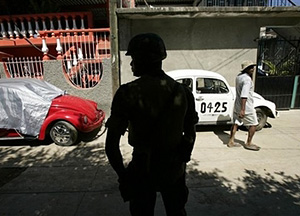 |
 |
 |
 News Around the Republic of Mexico | February 2007 News Around the Republic of Mexico | February 2007  
Drug Violence Threatens Mexico's Tourism
 Natalia Parra - Associated Press Natalia Parra - Associated Press


| | A soldier, center, stands guard in a working-class neighborhood in the resort city of Acapulco, Mexico, Wednesday, Feb. 7, 2007. Violence continues to plague this city, where gunmen dressed as soldiers staged and videotaped simultaneous assaults on two offices of the state attorney general Tuesday, killing at least seven people. (AP/Gregory Bull) |
Brazen daylight killings by presumed drug smugglers just up the hill from Acapulco Bay are worrying business leaders that increasingly bloody drug wars will cripple Mexico's critical tourism industry.

Hotel owners and other business leaders in the Pacific coast resort have demanded officials do something to quell the violence that has been closing in on the city's beachfront hotels, flashy discos and fish taco eateries.

In one of the boldest attacks yet, assassins dressed as soldiers barged into two state police stations shortly before noon Tuesday, demanded the officers hand over their guns and then opened fire. Five police investigators and two secretaries were killed, and witnesses said the simultaneous attacks were videotaped by the assailants.

Federal authorities said Wednesday they were investigating whether some of the slain officers had ties to drug traffickers, and whether the killings were meant to settle scores between the rival Gulf and Sinaloa drug cartels.

Mayor Felix Salgado told business leaders at a breakfast meeting Wednesday that authorities were patrolling the tourist zone and will "guarantee the safety of those who visit us."

"I hope this does not affect the tourist image," he said. "We realize that these events are unpleasant, but people know that they are separate events."

One of the stations hit Tuesday was near a highway used by tourists driving into the resort. Days earlier, two Canadian tourists were grazed in the legs by bullets fired into a hotel lobby on the main tourist strip.

A city of more than 720,000, Acapulco has always had a problem with crime, but until recently the violence occurred mostly in the poor neighborhoods blanketing its verdant hills, far from the gleaming five-star hotels along the coast.

Since last April, however, the attacks have become more blatant: The smugglers have carried out at least six beheadings. Several officers' heads were spiked on a railing in front of a downtown building. Another head floated up just off the beach. A decapitated body was found in a hotel room in Pie de la Cuesta, a popular resort just north of the city line, and a municipal police officer was gunned down outside a disco in the tourist zone.

The violence has increased as the Sinaloa and Gulf cartels battle for control of lucrative routes off the Pacific coast for U.S.-bound Colombian cocaine, belying Acapulco's image as a relaxing, tropical paradise and threatening to scare away foreign tourists who spend $12 billion in Mexico each year.

Cartels also are battling over domestic drug sales as drug consumption grows inside Mexico, where few places seem immune to violence.

Since taking office in December, President Felipe Calderon has deployed more than 24,000 soldiers and federal police nationwide to fight drug gangs, including about 7,000 sent to the Acapulco region.

Calderon calls the violence an unfortunate response to his military crackdown, which has included the extradition to the United States of Gulf kingpin Osiel Cardenas, suspected former Sinaloa leader Hector Palma Salazar and two other druglords.

The officers in Acapulco may not have been surprised by the order to turn over their weapons to men who appeared to be federal soldiers. In Tijuana last month, federal troops stripped city police officers of their guns for inspection amid allegations that some were colluding with drug smugglers.

Erit Montufar, who directs state police investigators in Guerrero, the state where Acapulco is located, said the assailants acted as if they were carrying out a similar operation Tuesday. All the assailants escaped and no arrests have been made.

Viviana Macias, the federal attorney general's spokeswoman, said her office was probing whether the slain officers had been working with smugglers.

"That's one of the leads we are following," Macias told The Associated Press. "All we know now is that it appears to be an organized crime gang that disguised themselves as soldiers."

One of the five police investigators killed had escaped an attempt on his life just last month, Macias said.

The Sinaloa and Gulf cartels have recorded killings in the past. The Mexican newspaper Milenio reported Wednesday that videotaping executions was a characteristic of Edgar Valdez Villarreal, aka "Barbie," the reputed chief hit man for the Sinaloa Cartel. According to the federal Attorney General's Office, Valdez is in charge of defending Acapulco from Gulf Cartel attacks.

In 2005, a homemade DVD was sent to two U.S. newspapers, apparently showing four Gulf Cartel hit men being beaten and interrogated and one shot in the head. Police said the DVD revealed a dispute between drug gangs. | 
 | |
 |



